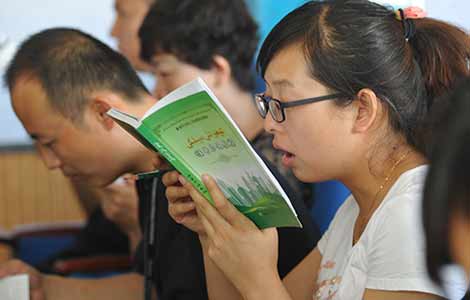Power points
Updated: 2013-08-09 09:19
By Andrew Moody (China Daily)
|
|||||||||||
|
James B. Heimowitz, former president and CEO for North Asia of Hill & Knowlton Jonah Kessel / for China Daily |
|
Kerry Brown (left), executive director of the China Studies Centre at Sydney University; Zhao Minghao, research fellow at the China Center for Contemporary World Studies. Geng Feifei / China Daily Feng Yongbin / China Daily |
One area of the world where China has had global influence has been in Africa. Apart from a major trade relationship emerging, the Chinese have been an important actor in other ways. They have been responsible for building much-needed roads, airports, ports, hospitals and schools.
Jacques says that although China has been accused of economic colonialism in Africa, China has built influence there because it has a deeper understanding of the issues they face.
"China has gone through the development process itself and some areas of the country still have a per capita income similar to a number of countries in sub-Saharan Africa so I think there is a greater understanding," he says.
"The West on the other hand with its so-called Washington Consensus has tried to impose its own ideas on the continent, which has not proved successful at all and has been largely abandoned."
Westad, also director of the LSE IDEAS foreign policy research center, insists there is not some grand overarching Africa strategy from the Chinese but that the relationship is driven by business.
"The Chinese business leaders I have spoken to believe there will be strong economic growth in Africa over the coming decades so to get involved for commercial reasons seems a very good idea.
"There isn't some clear Chinese state African policy. It is really about commercial development."
Kerry Brown, executive director of the China Studies Centre at Sydney University, believes Shambaugh's book says more about America's fears about China than it does about China's own issues.
"Throughout the book there lurks the shadowy sense that in the modern world, when we speak of China's dreams and hopes, we are also having to deal with American nightmares and fears," he argued in Times Higher Education last month.
Brown believes when assessing China's influence in the world it is important to also take into account that the United States it has to deal with has changed since the terrorist attacks of Sept 11, 2001 and a Europe still dealing with the financial crisis.
"In that context, China has been as confused by how others have changed as it has been by the changes it has gone through itself."
Shi at Renmin University reckons the financial crisis may be regarded as a historic turning point in 50 years' time as to the beginning of American decline.
He insists, however, that we are not moving into an era where China will be a sole leader and have major influence over the rest of the world.
"I think we are going to move into a much more multi-polar world. China is not going to replace the United States as the dominant world power. The United States is going to experience relative decline but we are going to move into a much more multi-polar world where a number of countries have power and influence," he says.
Zhao at the China Center for Contemporary World Studies, still believes that global institutions are those that emerged in the aftermath of World War II and this make it difficult for China to be a global leader.
"We have seen the rise of the Asia-Pacific region and other emerging countries and this has to be reflected in some way (through international institutions)."
andrewmoody@chinadaily.com.cn
(China Daily European Weekly 08/09/2013 page1)
Today's Top News
New green policy gives industries a big boost
Northeast China braces for major floods
Launches highlight India's ambitions
Chinese put on alert in Afghanistan
Social media counters papers
China to boost green industries
Go-between helped to cement key tire deal
Japan to carry out self-defense
Hot Topics
Lunar probe , China growth forecasts, Emission rules get tougher, China seen through 'colored lens', International board,
Editor's Picks

|

|

|

|

|

|







